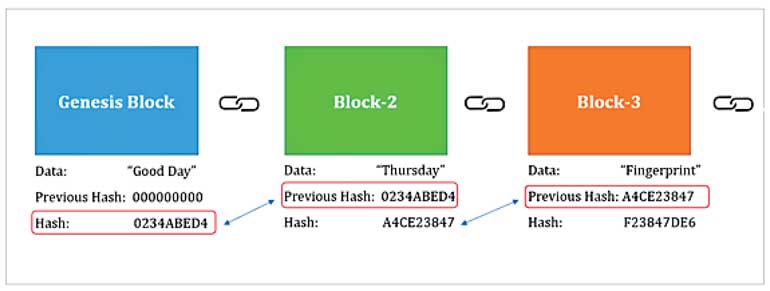Monday Feb 16, 2026
Monday Feb 16, 2026
Tuesday, 14 March 2023 00:25 - - {{hitsCtrl.values.hits}}

The intrinsic value of technology lies in its ability to transform the lives of the worst off and this solution to the lack of property rights in Sri Lanka, using a hybrid blockchain-based solution, does exactly that

Rumi is a lower 6th student interested in the specific areas of economics, and technology which benefit the worst off in society; and where governments need to intervene to catalyse a change that free markets cannot achieve. This is a summary of a research paper he has worked on for over two years and link to which can be found at https://vixra.org/abs/2302.0130.

Sri Lanka uses paper records to store land titles held in the Registrar General’s Department. It is an extremely inefficient process as lost land titles can take, on average, six to twelve months to retrieve, which limits the public’s ability to borrow against their immobile asset, making it what Hernando De Soto calls ‘dead capital’. This inefficiency is due to both internal inefficiency (as titles are passed down through decades) and corruption. Since most citizens do not write officiated wills, this land is often contested, making it difficult for the department to keep track of who owns what.
Below is a summary of my paper; the entire research can be accessed at https://vixra.org/abs/2302.0130, where I demonstrate how a blockchain solution will free up dead capital in a capital-starved country, reduce costs, time and allow entrepreneurship that will benefit the worst off.
A blockchain system
Blockchain is a digital filing cabinet, where digital land titles (in PDF form) are stored, linked and transferred. I propose a private company builds one for the Sri Lankan land registry, to maintain a level of decentralisation, and obtains a percentage of the transaction fees for a set number of years. This proposal is borne out of the realities of how long governments take to implement change and how private enterprise can remove corruption if incentivised.
A blockchain-based solution guarantees reduced corruption due to decentralisation and data protection by white-hat hackers and monitors. There is an increase in accountability and efficiency as all documents are organised and available at the click of a button. Security is guaranteed due to multiple firewalls and white hat hackers, and transparency is increased due to the hash key sequence and the traceability of all data entries into the system.
It will also contribute to the economic rejuvenation of a crippled Sri Lankan economy as now all citizens can use their property to generate capital (loans against property) and then use this money to grow their businesses, and increase their purchasing power.
I propose the Government authorise a pilot project using the Colombo International Financial City (Port City). The majority of available Port City property is unsold and has negligible infrastructure due to its recent construction. The private company can begin immediately by designing and creating the system for Port City to prove that the blockchain solution works, thus encouraging the Government to implement it on a national level.
Naturally, there are limitations to the proposal, which are addressed in the following paragraph.
Firstly, there is a stigma attached to being ‘in debt’, especially in South Asia. People naturally avoid borrowing unless they are desperate. The Government can take two routes to erase the stigma gradually. The first is a policy of non-intervention. Due to Sri Lanka’s current economic crisis, the Government can assume that people will be forced to borrow against their property to feed their families (this is non-productive borrowing) if presented with the opportunity. The other, more long-term sustainable method is secretly insuring (using a Non-Disclosure Agreement) the first 5,000 loans obtained against property using digital land titles on the blockchain network. This will be a confidential contract strictly between the Government, the private company, and property owners. Since the property owners will anyways likely be able to settle their debt (if they do not, the Government will pay back the loan and it will seem as if the owner has paid the loan back) this will encourage others to trust the system and take loans without Government interference.
Secondly, an advantage of the blockchain solution is that it is corruption-proof. As a result, corrupt politicians are likely to oppose this change. In the case of this event, the private company must reach out to international institutions to support the project. Historically, institutions like the World Bank have been pro-development technologies, and since this project alleviates poverty, by providing the poor with collateral, they are likely to support it. The private company must also educate the public on the advantages of a blockchain-based solution for property rights. As seen with the recent anti-Government protests, the public is ready to fight against corruption and may support blockchain as an anti-corruption policy. However, the Government is likely to approve this project due to one of its advantages – poverty alleviation leading to economic rejuvenation; this sole advantage is enough incentive for the majority of the Government to back the project. The private company is likely going to need a face for the project in the form of a politician to help push the project into Parliament for approval and to win the support of the public.
The IT sector also has tremendous potential, as shown in the UN E-Participation Index, where Sri Lanka ranks in the top 33%. International institutions can invest in the IT sector and are incentivised to do so because investment is directly linked to poverty alleviation via blockchain for property rights. It is important to note that the implementation of a blockchain-based solution for property rights does not require near 100% internet penetration. This is due to the presence of a decentralised public registry, which is essentially the current public registry run by a private company. Note that the Government will still have paper document backups of the land titles stored in their offices.
Post-blockchain implementation, workers will be hired from the Registrar General’s Department to authorise transactions on the network. According to a worker at the Registrar General’s Department’s Office (Interview conducted by me on 16/9/2021), many office members cannot use a computer, let alone manage a nationwide blockchain server. The Registrar General’s Department is unaware that the blockchain system requires little intervention and runs predominantly on autopilot). Any technical difficulties are managed by the private company, not the Government, to maintain decentralisation. The private company will also be forced to educate Registrar General’s Department employees on how to use the system. If people are not trained, this may cause malfunctions and data to be compromised.
Blockchain has the power to transform the Sri Lankan economy by unleashing the power of ‘dead capital’. This has been done in Georgia, which introduced blockchain for property rights to reduce corruption and lower the transaction fee. Georgia went on to achieve a ranking of 5/190 for the registering property section of the doing business indicator. Georgia began by creating blockchain networks for land titles in Zones for Employment and Economic Development (ZEDEs). The initial project in the ZEDEs showed the government and people that the solution worked effectively and thus encouraged them to implement it nationwide. Ghana has also made plans to work with Bitland and IBM on developing a similar blockchain system with the aim of economic rejuvenation by giving people the power to borrow against their immobile assets.
People refer to a blockchain trilemma, where one has to pick two out of security, scale and decentralisation. Since this is a national project involving over 22 million Sri Lankans’ most important documents, scale and security are vital. Decentralisation comes second, it is important to remember that the Sri Lankan Government reserves the right to intervene in blockchain-based solutions to a certain extent. They can view everything on the server, public and private blockchains. However, to maintain some level of decentralisation, they cannot alter information on the server; they can only view information – they cannot change information on the blockchain network either.
I believe that the intrinsic value of technology lies in its ability to transform the lives of the worst off and this solution to the lack of property rights in Sri Lanka, using a hybrid blockchain-based solution, does exactly that.
(The writer can be reached at [email protected].)